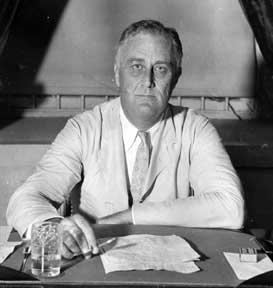 |
After bringing the immediate banking crisis under control, Roosevelt worked to find additional methods and means to relieve the suffering of the American people. Roosevelt’s first action as President was to call for the repeal of Prohibition. He accomplished the repeal by sending a short message to Congress. Congress quickly responded and passed an act to repeal the amendment. On the March 14th Roosevelt sprang a new initiative on his advisors. Roosevelt pitched a plan to put thousands of young unemployed Americans to work in the U.S. Forests and National Parks. The idea, which became known as the “Civilian Conservation Corps,” called for giving unemployed workers food and housing in the parks, as well as paying them $1 a day. Also, $25 of their monthly wages could be paid directly to their families in the city. |
|
| The plan to create the “Civilian Conservation Corps” was devised by President Roosevelt, along with his advisor Raymond Motley. The President and Motley sent a draft proposal of the program in skeleton form to the Secretaries of the various agencies that would have to administer it. Within one week, the Secretaries of the relevant agencies (Wallace, Ickes, Perkins, and Dern) had put together a detailed plan to submit to Congress. The program began with a quarter of a million men given work assignments, coordinated by the Agriculture Departments Forest Service, in cooperation with the Labor and Interior Departments. The US Army was to provide the logistics to set up and run these camps. |
 |
|
| The first recruit was 19-year-old Fiora Rizzo of New York. He and his three friends could only put together 50 cents of the 65-cent fare to the campsite. A generous army Captain paid the difference. Rizzo was from a family of 19, whose father had not worked in 13 years. Rizzo was given a compulsory physical exam. Then, he was sent to an army base for basic physical and accepted conditionally. Finally, he was sent to the South to work. By July 275,000 enrollees were working in 1,300 camps. By the time the program ended, its participants had built 125,000 miles of roads; 46,854 bridges; and 300,000 dams. They planed 3 billion trees and strung 89,000 miles of telephone wire. The Civilian Conservation Corps was a great success. |
|
| |